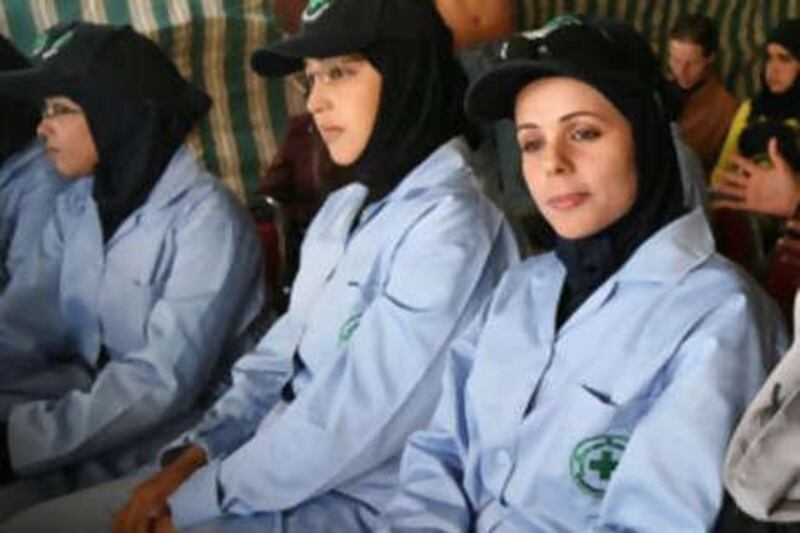JABER, JORDAN // Sabah Qteish is looking forward to starting her first job. But for the 27-year-old it is hardly the kind of job most other women are accustomed to. She is heading to the far corners of her country where she will be clearing landmines. For her, it is a job motivated by personal tragedy. Her father, Gassem, was injured 25 years ago on the Jordan-Syria border while he was riding his camel. "My father was on the camel when it was startled by a dog. The saddle was not tight and he fell on a landmine that injured his right leg," she said. "His life was difficult. His leg was amputated and he walks on a prosthetic leg. "I felt that the landmine has taken him away from me, and I do not want others to suffer like him." Ms Qteish is one of 23 women who graduated from a six-week training course yesterday that marked the creation of the first all-female landmine removal team in the Middle East. The course was led by the Norwegian People's Aid, an international humanitarian organisation. The NPA, which started operating in Jordan two years ago, was invited by the National Committee for De-mining and Rehabilitation, the kingdom's leading mine-action authority, to help clear the country's landmines, in accordance with the Mine Ban Treaty, or Ottawa Treaty, which Jordan ratified in 1998. The organisation will deploy Ms Qteish and 15 other women to the northern minefields and will dispatch a second team in February. The NPA began mine clearance operations in the north in April. The three-year project is targeting 93 minefields stretching 104km along Jordan's border with Syria. The landmines were laid by the Jordanian armed forces in the early 1970s after a Jordanian confrontation with Syria. The minefields threaten the lives of 50,000 citizens and hamper the development of land. Mette Ravan, Norway's ambassador to Jordan, said they hope to clear all the mines by 2011. "The clearance of this area is the last important step needed for Jordan to be mine free," she said during the graduation ceremony. Once the landmines are removed, Jordan will continue works on the Wihda Dam project on the Jordan-Syria border, which is expected to supply the country - one of the world's 10 poorest countries in terms of water resources - with 80 million cubic metres of water a year. Other landmines in Jordan were laid in the Jordan Valley and on the border with Israel south from the Dead Sea to the Red Sea after the partition of Palestine in 1948 and the following Arab-Israeli conflicts. The military started clearing the mines in the Jordan Valley in 1993 and the area was declared free of landmines this year. In May, the NPA cleared the border area between the Red Sea and the Dead Sea, freeing 14 million square metres of previously mined land and removing more than 50,000 landmines. Landmines in Jordan affect eight per cent of the country's 5.8 million population by hindering socio-economic development and posing a threat to civilians. Between 2005 and 2007, landmines injured 50 people and killed three, according to last year's landmine monitor report. The NPA landmine removers have to be physically and medically fit. On average, they received 30 hours of training a week, which included raking and metal detection. Each will be paid US$760 (Dh2,790) per month, a high salary for many who live in remote and impoverished villages. Although the job is risky, Hanan Ababneh, a mother of three, said she was not afraid. Ms Ababneh, 31, will use the money to support her family and pay off loans. "I am taking this job for my children's sake," she said, holding her nine-month-old baby boy, Raed. smaayeh@thenational.ae
All-women landmine team is a first
Dangerous work provides an opportunity for females to clear lethal explosives littering Jordan's border area with Syria.

Editor's picks
More from the national




